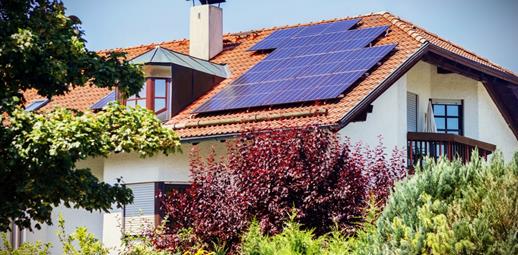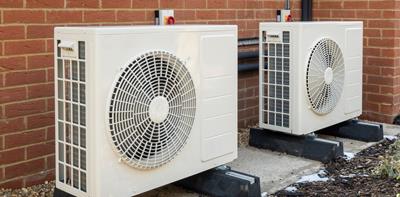
Installing solar panels could increase your home’s value as you can save money on electricity bills, which is attractive to potential buyers and renters. Solar panels also appeal to people who want an eco-friendly way of lowering their carbon footprint.
We explore the pros and cons of solar panels and how they could affect your property’s value when you decide to sell.
EASY AS HACK
You can sell excess electricity from your solar panels to the national grid via the Smart Export Guarantee (SEG), but you’ll need a solar battery as well.
At a glance
- Solar panels could increase your home’s attraction to potential buyers and, therefore, its value
- Cheaper energy bills are solar panels’ main asset, especially if you have a solar battery to store excess energy to sell back to the national grid
- Some buyers may be put off by the look of solar panels, particularly if they seem out of style compared to the neighbourhood or the age of the house.
WHAT ARE SOLAR PANELS?
Solar panels convert the sun’s energy using solar, or photovoltaic (PV), cells to generate electricity for use in the home, resulting in cost savings from cheaper energy bills.[1]
The PV cells are typically made from silicon, which produces an electric charge when exposed to direct sunlight.[2] They’ll even produce electricity on a cloudy day, although you will get less.
Solar panels’ power depends not just on the weather but also on their size and number, shade from vegetation, and the direction they face on your roof.[3] Location is another factor. Homes in the south have more hours of sunshine than other UK regions, making them the best locations for harnessing solar power.[4]
A solar power electricity system offers renewable energy without creating greenhouse gas emissions that can damage the environment.
BUT DO SOLAR PANELS ADD VALUE TO YOUR HOME?
Some experts estimate that installing solar panels can add an average of 14% to your home’s value. [5] Here’s how.
- Solar panels increase home value by reducing electricity bills and improving your energy performance certificate (EPC) score. As a result, you can live in your home for less.
- Renewable technologies, such as battery storage with lower usage tariffs (time-of-use rates) and sought-after electric vehicle (EV) charger points, could make your property even more valuable. [6]
your bills will be cheaper
Solar panels can affect how much you pay for energy, reducing your electricity bills by around 64% depending on the system, such as the size and number of panels and how much power you generate. [7]
Using the sun’s power helps you to reduce your electricity bills. One estimate suggests a typical household with a 3.5 kW solar panel system can save £160-£420 annually on energy bills.[8]
Another example shows you can save as much as £534 a year if you live in a south-facing property in southern England with a 40-degree tilted roof, no shade, and a 4,900kWh consumption. It assumes you have 14 panels (325W), a 10.4 kWh battery and electricity costs of 17.812p/kWh. [14]
A solar panel system can make you less reliant on the national grid but you will need to add a solar battery to your solar panels to sell surplus power back to it through your energy supplier.[3] You can sell excess electricity to the national grid via the Smart Export Guarantee (SEG), which pays for the energy you generate.[1]
When your system is ‘grid-connected’, you can still get power if your panels aren’t generating enough electricity. Storing excess energy during cheaper time-of-use rates means you can use that power later, even during more expensive times of the day. [4]
With a solar panel (PV) diverter, you can save even more money by diverting excess energy from your panels to an immersion heater or other device. [4]
To charge an EV overnight, you’ll need a solar-panel EV charger, a PV inverter unit to convert the current from DC, which the panels use, to AC (which EVs use), and a battery storage system. [16] You might also need to swap to an EV tariff to get the best out of charging the vehicle overnight. [17]
With energy prices fluctuating considerably in recent years, cheaper energy bills are one of several reasons solar panels add value to your home.
CHARGING POINTS AND MORE
When installing your solar panels, many installers offer extra options, such as charging points for an electric vehicle. You’ll also need a solar battery to store unused energy at night for future use.
Manufacturers are selling more new electric cars yearly, so adding an EV wall box to your home is becoming more popular. [9] An EV charger point could increase your property’s value between £3,000 and £5,000. [10]
Energy Performance Certificate (EPC)
Another way you can add value to your home is by getting a higher energy performance certificate (EPC) from energy-efficient improvements like installing solar panels. In many places, including the UK, an EPC is required when a property is built, sold, or rented.
An Energy Performance Certificate (EPC) is an official document that evaluates and rates the energy efficiency of a building, including heating, cooling, hot water systems, insulation, and building materials.
EPC ratings
An energy efficiency rating of A (highest efficiency) makes your home more sellable than one with a G (lowest efficiency) rating. For instance, a house value increase of as much as 14% if your home goes from the lowest rating G to the higher rating A. [12]
The certificate also includes recommendations for improving energy efficiency, which can help reduce your energy bills and environmental impact.
CAN SOLAR PANELS DECREASE THE VALUE OF YOUR HOME?
Solar panels would not necessarily negatively impact the price of your house, but some considerations could put prospective buyers off, such as:
-
-
Maintenance Costs
-
Solar panels need some maintenance, including occasional cleaning twice a year and trimming of shrubs and trees to maximise the sunlight getting to them.[6]
-
-
REPLACED PANELS
-
Another worry could be that you must replace solar panels if they become outdated as technology evolves. [6] but some can last longer depending on the type. [18]
PV inverters (an essential device for converting the direct current (DC) electricity the panels capture into the alternating current (AC) suited for UK homes) need replacing after 12 years.[1] It’s the same for PV diverters.
-
-
VISUAL CONCERNS
-
Solar panels can be pretty substantial and dominate a roof. As such, some buyers think they look ‘ugly’, especially on certain types of buildings like a period property. These views may limit who would be interested in your home. However, solar panels are becoming smaller and more visually appealing as they evolve.
-
-
TECHNOLOGICAL ADVANCEMENTS
-
Buyers might worry that the solar panels could become outdated quickly as new technologies emerge, which could potentially reduce their effectiveness and value.
BENEFITS OF INSTALLING SOLAR PANELS
You can make significant savings but remember that solar panels are a long-term investment with high upfront costs.
-
property usp
Solar panels could make your house more attractive in the marketplace. One energy survey showed that 69% of people would likely buy or rent a property with solar panels. [13] Your home could be what buyers are looking for and could be the deciding factor when purchasing.
What’s more, buyers and renters will pay more for houses that are green or highly energy efficient. One estimate says buyers would consider paying 10.5% to 20% extra for a low-carbon property, while renters would willingly pay a 13% premium.[11]
-
own source of power
The energy crisis has shown how much the UK relies on fossil fuels like oil and gas. It has meant a significant rise in energy costs, affecting households everywhere. However, an independent power source from ‘free’ sunlight could protect you from rising costs and power outages.
IS IT WORTH INSTALLING SOLAR PANELS BEFORE SELLING MY HOUSE?
Your investment in solar panels for your home could pay for itself, but how long it takes depends on your circumstances, like how much they cost initially, where you live, the periods you’re at home, and whether you signed up for the SEG scheme. [6]
Most estimates range from 14 to 25 years before solar panels pay for themselves. Others put the payback period as 13 to 14 years for an average three-bedroom house with a 2 to 6 kWh battery. [4]
So, installing solar panels immediately before you move house is probably not worth doing. Even though solar panels can reduce your energy bills, it will take several years before the energy savings help your investment to break even.
Still undecided? Discover whether solar panels are worth installing in your home.
Your home insurance policy should cover your solar panels. Check with your insurer to see if you are.
FAQs
HOW MUCH VALUE DO SOLAR PANELS ADD TO YOUR HOME?
Estimates about the value solar panels add to your home vary. A report by BOXT in 2024 found that solar panels increased property values by an average of 14%. The report estimated that it added £90,000 to a home in London and £29,300 to one in Manchester.
WHAT FACTORS AFFECT HOW MUCH SOLAR PANELS WILL SAVE ME?
The factors that affect how much solar panels will save you include your system’s size, how much electricity your home consumes, whether you use a lot during the day (for example, you work at home), your system’s efficiency and the rate you receive from the SEG scheme. [15]
DO SOLAR PANELS COME WITH MUCH MAINTENANCE?
Whether solar panels come with much maintenance depends on the type of solar panel installed. Technological advances mean you can get solar panels with a special coating that protects them against rain, water and dirt.
HOW LONG DOES IT TAKE TO GET A ROI ON SOLAR PANELS?
The time it takes to get a return on investment (ROI) on solar panels could depend on many factors, such as how much sunlight they absorb. The more energy they store, the more you have to use.
WHAT IS AN EPC RATING?
An Energy Performance Certificate (EPC) is an official document that evaluates and rates the energy efficiency of a building. An energy efficiency rating of A (highest efficiency) makes your home more sellable than one with a G (lowest efficiency) rating. See more information above.
HOW LONG DO SOLAR PANELS LAST?
Solar panels can last over 25 years on average.
ARE SOLAR PANELS COVERED IN HOME INSURANCE POLICIES?
Most building insurance policies cover solar panels but always double check the policy wording. Exclusions may apply, such as damage caused while cleaning. Learn more about Ageas buildings insurance.
Sources
[1] https://www.hiesscheme.org.uk/renewable-energy/solar-panels/#what-are-solar-panels
[2] https://www.nrel.gov/research/re-photovoltaics.html
[4] https://www.independent.co.uk/advisor/solar-panels/solar-panels-guide
[5] https://www.boxt.co.uk/news/guides/boxt-energy-report
[6] https://energysavingtrust.org.uk/advice/solar-panels/
[7] https://www.theecoexperts.co.uk/solar-panels
[8] https://energyadvicehelpline.org/are-solar-panels-an-attractive-asset-to-prospective-homebuyers/
[9] https://www.thecarexpert.co.uk/best-websites-for-buying-an-ev-home-charger/
[12] https://www.moneysupermarket.com/gas-and-electricity/value-of-efficiency/
[15] https://www.theecoexperts.co.uk/solar-panels/cost#link-how-much-will-solar-panels-save-you
[16] https://octopusev.com/ev-hub/charging-electric-cars-with-solar-panels
[17] https://octopusev.com/ev-hub/guide-to-energy-tariffs-for-electric-cars


